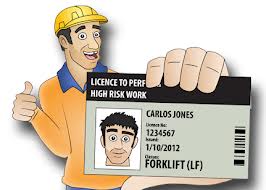 The new Work Health and Safety Act 2012 have introduced changes to the licences needed to do high-risk work and its regulations. It's mandatory to comprehend the amendments in order to perform high-risk work. You have to undergo intensive training to be conducted by an RTO in order to gain license needed. An assessment will follow by an accredited assessor through a registered training organisation.
The new Work Health and Safety Act 2012 have introduced changes to the licences needed to do high-risk work and its regulations. It's mandatory to comprehend the amendments in order to perform high-risk work. You have to undergo intensive training to be conducted by an RTO in order to gain license needed. An assessment will follow by an accredited assessor through a registered training organisation.
You have to be enrolled with an RTO. A licence is not required for a specific work. For example, it is not necessary to become a licensed boiler operator if you are currently doing high-risk work in a heritage boiler. In the same way, you don't have to be a licensed crane operator if your work is limited to setting up or dismantling crane or hoist.
If you are working in a plant, a licence is not required provided:
(1) The work is done at a workplace solely for the purpose of manufacturing, repairing, maintaining, servicing, altering, demolishing or disposing the plant or moving the plant within the same workplace.
(2) The plant is operated or used without a load but not necessarily all like those with standard weight loads with fixed points used for plant calibration.
It should be noted though that moving does not include loading the plant or unloading the plant from the equipment that is utilised to move the plant. At this point, a high-risk work licence is mandatory to unload/load a plant to a transportation vehicle to and fro the site of work given that the plant concerned requires high-risk work licence.
A licence to operate a reach stacker is needed if the capacity is more than 3.0 tonnes. Starting 01 January 2013 the worker requires a CN class of licence. But the deadline to secure an RS class is only up to December 2013.
Certain changes in boiler licences were implemented. Boiler classes were reduced from three to two. Prior to the amendments, there was Basic (BB), Intermediate (BI) and Advanced (BA). Now there are only two - Standard (BS) and Advanced (BA). You will be granted with a BS licence if you are currently holding a valid BB licence. However, you are required to upgrade to a BA licence by 31 December 2013 in order for you to operate a boiler should you be holding a BI licence and must incorporate certain licence features like:
- Multiple-fuel source
- A pre-heater
- A super heater
- An economiser
A BS licence is granted should you not be able to upgrade your licence by December 2013. Then that's the time you will be issued with a BS licence. But you will not be allowed to operate boilers with a single-fuel source with no super heater, economiser or a pre-heater attached.
Unless you are associated with an RTO, you are not allowed to assess (if you are an assessor). The same thing goes when the RTO is classified as high-risk licence where the job scope is for delivery in Tasmania. The accredited assessors should ask approval before they can enrol applicants to perform high-risk work licence if they are non-residents of Tasmania.



